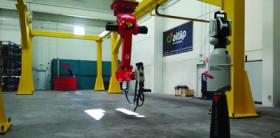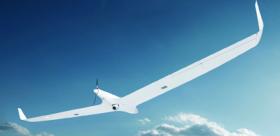Bogdan Padiu, Teamnet Group: More than 40% of our projects will be regional by 2018
Innovation, ambitious plans and Romanian intelligence have fuelled Teamnet Group's development over the past 14 years into one of the most important IT&C integrators in the region, with annual revenues close to 90 million Euro. The group plans to further capitalize on its vast expertise and capabilities in delivering complex products and projects, aiming to enhance its strategic development at international level
2015-10-18 23:24:12 - From the Print Edition
Imagine a factory where technology is the very core of the entire manufacturing process. A facility so advanced that human intervention is no longer necessary and where the traditional manufacturing line is virtually unrecognizable from that of as little as ten years ago. Smart, flexible and collaborative robots control each step of the production, while notions such as Big Data or Internet of Things fundament the overall activity of the manufacturer. This is what the factory of the future will look like. But the future is closer than we can imagine.
In only one month, a next-generation complex and multifunctional industrial robotic assembly composed of 22 pieces forming an impressive flexible platform 20 meters long and six meters wide will be available for trial use and, further on, for deployment in today's factories worldwide. Megarob, the advanced technological system, in which Teamnet is working alongside prestigious international companies, includes a spherical robot, a 3D gantry crane and a laser monitoring system that enable the automated execution of high precision operations in the production of medium and large components and structures.

"Megarob is a unique invention in the world, through the advanced integrated technologies in the field of robotics. The system replaces the use of several robots in a common production line, or works on huge parts, offering companies the possibility to innovate the working process, thus streamlining the operations and necessary investments on this segment. Megarob will revolutionize the production process in various fields such as aeronautics, railway and sea transportation, infrastructure engineering and renewable energy," stated Bogdan Padiu, CEO of Teamnet Group.
The project was launched in 2012, alongside six other organizations from Spain, Luxembourg and Switzerland, coordinated by AITIIP Technology Centre. "Teamnet is responsible for defining, developing and implementing innovative technologies in the field of industrial robotics such as the software interfaces and the control system of this robot," added Padiu.
Ten percent investment in R&D annually
Teamnet invests in research and development projects year by year, aiming to create next generation solutions that will make a real difference in the society. The group's constant involvement in this area has been ongoing since 2011, as a long term endeavour and a strong commitment, with the company investing ten per cent of its turnover annually. "During the last years, Teamnet has specialized in different innovation fields from Natural Language Processing, Big Data and Computer Vision to Robotics, Internet of Things and Ambient Assisted Living. Currently, we are focusing on four main R&D directions: Robotics, Cloud, Internet of Things and Smart Cities," stated Bogdan Padiu.
112 Services across Europe
NEXES – the Next Generation Emergency Services project stands out through its ambitious objective to deliver innovation to 112 services across Europe and lead to the development of a truly universal emergency situations management system. NEXES exploits advanced systems and technologies to rapidly ascertain the location of emergency callers or incident sites and thus gain precious response time to save lives. From Romania, Teamnet and Orange have joined forces in this endeavour. Based on communication infrastructure provided by the telecom player, Teamnet develops and integrates software solutions dedicated to the management of emergency situations.
"NEXES is an extremely important EU initiative, part of the HORIZON2020 R&D program, and has the potential to sustainably contribute to the innovation of the European emergency services by democratizing and standardizing activities in emergency situations throughout Europe. Using Teamnet technologies, NEXES enables the use of total conversation capabilities in emergencies, including social media, to the benefit of citizens. It allows the exploitation of improved location information to rapidly and effectively identify and locate the caller and the incident site. It enhances interoperability and shared awareness among emergency services by leveraging Internet-enabled connectivity, to the benefit of a more secure society," stated Teamnet's CEO.
Research and development initiatives are therefore a key element in Teamnet's current strategic development plans in Central and Eastern Europe and the Middle East and North Africa.
The World from Above

Flying robots are no longer inaccessible solutions. Today they are becoming less costly to build and easier to manoeuvre. Asked about the future of the unmanned aerial vehicles, Bogdan Padiu believes that within five years, this technology will be widely used in agriculture, law enforcement, energy, utilities, mining, construction, real estate and emergency situations. "Already, Teamnet's integrated UAV systems are used, alongside GIS technologies, in monitoring and collection of high accuracy data from the ground, while the potential for growth is significant. The border between Romania and Serbia is safer as a result of the development and implementation of an integrated system dedicated to the management of situations such as natural disasters, insuring a safer border for the citizens," added the CEO. Teamnet is the first Romanian company to export integrated UAV-based solutions in the region.
The group announced two months ago a volunteering action by using the Hirrus integrated UAV system in the biggest search and rescue mission in the recent history of Romania, supporting the authorities in finding the glider who was declared missing at the beginning of August. As part of this mission, in the course of five days, the unmanned aircraft monitored a wide surface in Brasov county, collecting over 15,000 high-precision photographs in order to create a map of the monitored area.
"From coordination of emergency services at the national level to handling of management plans for protected areas in Romania or administration of public pension and insurance systems, our projects aim at setting the foundations for the technological infrastructure required for regional development", outlined Padiu.
Future regional plans
As part of the group strategy and roadmap, the company has seen an accelerated development on local and international markets in the past few years. Teamnet's regional expansion began in 2010 and today the group is present with direct operations in Romania (headquarters), Turkey, Belgium, Croatia, Serbia and the Republic of Moldova, while also counting a total of ten countries where it is actively developing projects alongside regional partners. "This step allows us to enforce our position as a regional player and grow our revenues from international markets, with the business objective of generating 40 per cent of revenues from this area by 2018," said Bogdan Padiu.
To achieve this objective, Teamnet constantly invests in the know-how of its team, currently counting 800 specialists and experts with multiple certifications in the company's areas of expertise. As part of its strategic regional approach, Teamnet supports and promotes Romanian intelligence and creativity for developing advanced technologies throughout Europe, once again emphasizing Romania's expertise, advantages and growth potential in IT&C.
What is the key factor for growing international business? Bogdan Padiu is convinced these results are driven also by strategic partnerships. Teamnet consolidated its previous partnerships and created new ones, with two renowned investors in 2014 – International Finance Corporation, a member of the World Bank Group, and Black Sea Trade & Development Bank, as minority shareholders. The group also collaborates with other important names on the international market such as Microsoft, IBM, Airbus, NEC, and Cisco. Teamnet further aims to strengthen its existing collaborations and develop new ones at the regional and international levels of each industry (Emergency, Transportation, Cloud and Big Data), in line with product transformation and international expansion. Ymens, leading national cloud company and part of Teamnet Group, and NEC Corporation develop together governmental cloud services for Romania.
"We will continue to consolidate our regional growth strategy and maintain our focus on producing technological infrastructure. For the following years, our roadmap remains the development of complex products and projects that reach out to society and constantly generate innovation, at the same time developing technological infrastructure at points where it is missing", said Padiu. "As part of this roadmap, we plan to target new countries in the next years such as Poland, Italy and Bulgaria, as well as reaching a higher coverage of the CEE and MENA regions," emphasized the executive.
Teamnet Group recorded a consolidated turnover of 93 million Euro in 2014, 29 per cent higher compared to 2013, and was included for the seventh year in a row in the Deloitte Technology Fast 50 Central Europe rating. Also, Teamnet is the only Romanian company included in the category "Big 5" of the Deloitte Technology Fast 50 Central Europe rating in 2013, ranking third.
For further information about Teamnet Group, please access
www.teamnet.ro/en


